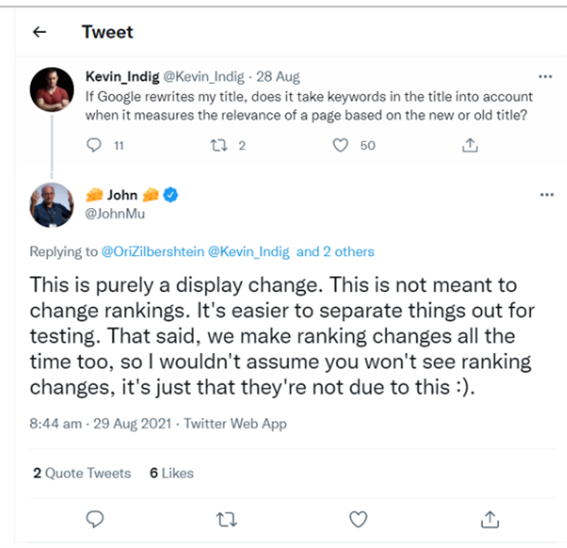On August 16th 2021, SEOs started to notice a clear change in how their titles were being rewritten in Google SERPs. Whilst in some instances this may have been a very small structural change, some titles had been rewritten completely to show very different information and intent than previously shown.
This left many in the dark regarding how this would affect their key metrics that drive web page performance.. Finally on August 24th2021, Google released information on the update to web page titles that gave SEOs clarity on how titles are now being generated in Google SERPs.
This change meant that Google was no longer simply using HTML title tags to generate titles in SERPs; a system that the search engine had been using for over a decade. For the first time, the text within the webpage has become equally as important to show Google the subject of the page.
So why did Google decide to make the change?
Google had begun working on improving page titles in search results since 2012. They see titles directly linking to a website’s content as being vitally important for searchers. Google feel that encoded HTML title tags aren’t always the most accurate description for a lot of web pages. This can be for various reasons such as excessive length, keyword stuffing or overused repetition.
In Google’s own words:
Overall, our update is designed to produce more readable and accessible titles for pages. In some cases, we may add site names where that is seen as helpful. In other instances, when encountering an extremely long title, we might select the most relevant portion rather than starting at the beginning and truncating more useful parts.
So now onto the most important question:
How does Google’s title rewrite update affect your web pages metrics?
Visibility metrics
The most alarming issue for SEOs was the significant ranking changes from these title changes. However, two members of Google’s search team put these doubts to bed explaining that this is purely a display change, with each page still having only one title tag. Ultimately, they’d confirmed that this change would not directly affect ranking.


Interaction Metrics
Whilst SERP rankings don’t appear to be affected, many SEO’s have witnessed fluctuations in the Click Through Rate (CTR) Many of the cases that had occurred saw a distinct change in language structure that had affected the intent to which they had been built to serve. In other words, these new rewritten titles no longer matched the pages content.
Take the below for example to show how the context and intent of a title can be affected:
H1:


What steps should an SEO take moving forward?
It’s vitally important for SEO’s to track the key performance metrics of their web pages and monitor any changes or updates from Google that may impact them. To put your mind at ease, Google has confirmed that on 80% of occasions they will continue using HTML title tags and will listen to feedback to ensure these updates are successful. As this is the first change of its kind over the past 10 years, it’s likely that Google will continue tweaking title changes to achieve optimum search performance.
If you have witnessed a drop in your CTR based on Google rewriting your title tags, Google have created a set of best practice for writing effective title tags that will perform best in SERPs:
- Ensuring every page on your site has a title specified in <title> elements.
- Be concise and descriptive with <title> elements avoiding vague and general language.
- Avoid Keyword stuffing and repetition in <title> elements.
- Be clear and concise with brand mentions in <title> elements.
- Be cautious and precise using robots.txt on your site to stop Google from crawling pages.
Read more: https://developers.google.com/search/docs/advanced/appearance/title-link
If you’re interested in finding out more about Google updates, check out our blog piece on Google’s MUM update here, or get in touch with us to discuss more about SEO.

